Following on from the first part of the blog two weeks ago, which covered inflation, explored the UK economy and used the MOT test example, this week we measure economic growth and employment. Last week, the latest data showed the UK economy remains resilient but fragile, backed up by new forecasts from the International Monetary Fund (IMF). This week sees a deluge of new data covering wages, vacancies and inflation, which should shed some light on the road ahead. The UK economy brakes may be worn, but do they need replacing? Simon Durling, from Santander Asset Management, shares his thoughts in this week’s State of Play.
Key highlights from this week’s State of Play
- IMF warns of higher UK interest rates
- UK wages and vacancies latest
- Latest UK inflation data
- Market update
UK economy resilient but fragile
The chart below shows that the UK economy over the last 12 months has been volatile when it comes to economic growth, although, it has not been the recession first predicted by policymakers at the Bank of England just over a year ago.1 Last week, data released from the Office for National Statistics saw the UK economy bounce back in August by 0.2% after contracting by 0.6% in July. If you look at the three months to August, Gross Domestic Product (GDP) grew by 0.3% and in the last 12 months by 0.5% overall.2 The topsy-turvy nature of economic activity feeds through into the main sectors of services, which dominate the UK economy, production, and construction. Output in the services sector rose by 0.4% in August 2023 and was the only positive contributing sector to the growth in monthly GDP. Production output fell by 0.7% and construction output fell by 0.5%.2
Contributions to monthly GDP growth, August 2022 to August 2023, UK
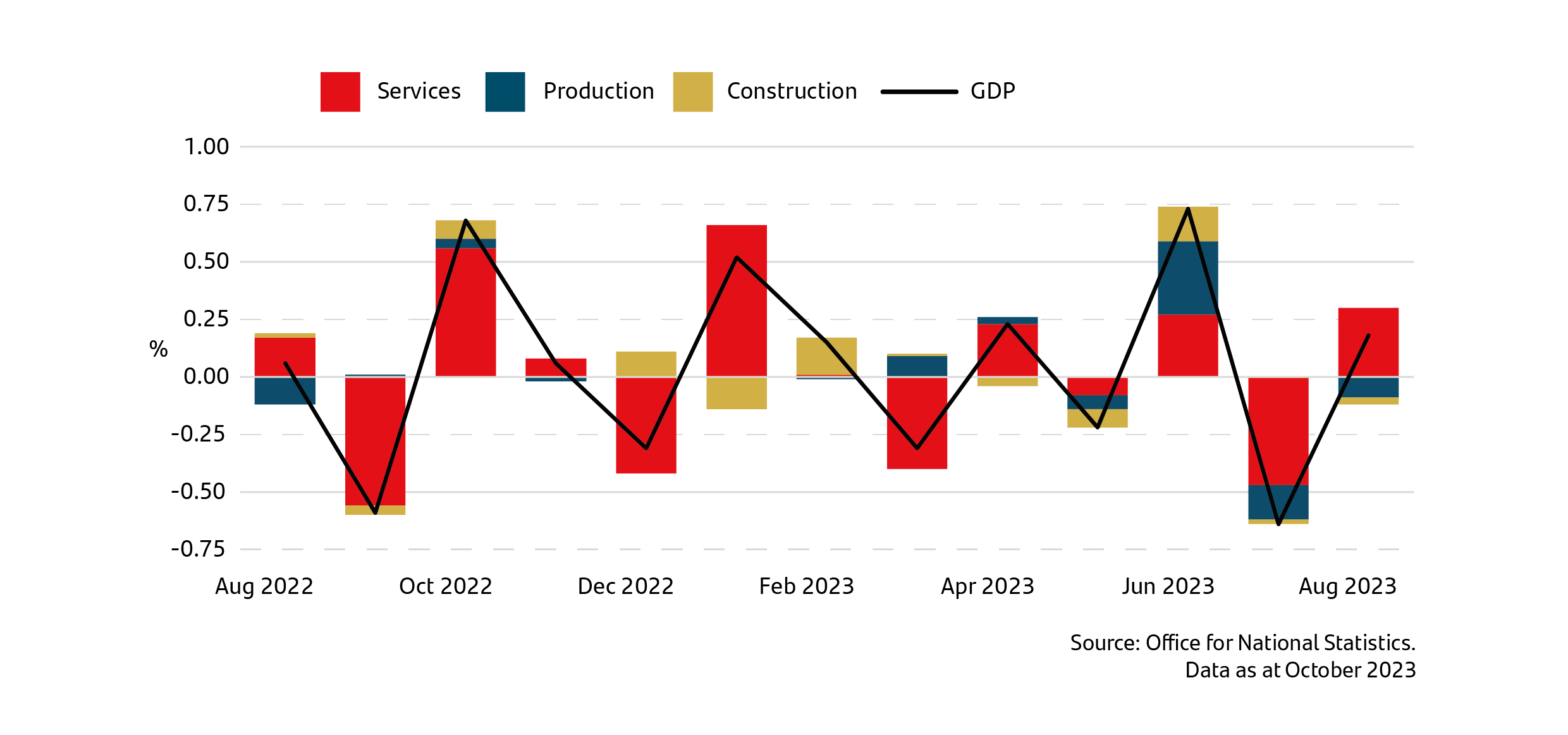
At their most recent meeting, the Bank of England kept interest rates on hold at 5.25%, citing progress in bringing down inflation but ongoing concerns about wage growth and tightness in the labour market. The International Monetary Fund (IMF), an organisation with 190 member countries, has yet again delivered a gloomy forecast for the UK economy when compared to other larger economies. It warned that UK interest rates could keep rising before peaking at 6%, but importantly, average 5% until 2028.3 Officials from the UK have pointed out the predictions from the IMF predated the adjustments by the Office for National Statistics (ONS) to the UK’s post-pandemic economic performance and the change in long-term interest rates factored in by the market in the last few weeks. The IMF has in the past singled out the UK with a poor economic forecast, like in 2022, when they expected growth to be 3.2%, well below the actual 4.3% that was achieved.3 Economic forecasting is very difficult, as so many factors can influence the final outcome.
Wages and vacancies latest
The annual rate of growth in regular pay excluding bonuses fell very slightly in June to August from 7.9% to 7.8%, close to recent figures and one of the highest since comparable records began in 2001.4 Average pay growth (including bonuses) was 8.1% in June to August 2023 (falling from 8.3% last month) affected by the NHS and civil service one-off payments made in June, July and August 2023.4 Although both figures fell, wage settlements remain too high to provide any comfort to policymakers. From July to September 2023, the estimated number of vacancies fell by 43,000 to 988,000. This is the 15th consecutive period to show a fall in the quarter since May to July 2022 and the lowest number of vacancies since May to July 2021.4 Ordinarily, when the ONS releases wage and vacancy numbers, they also announce the latest employment data, but this has been delayed to next week due to a low number of respondents from the Labour Force Survey. The Bank of England will be mindful that although inflation is gradually falling and other economic factors point to interest rate rises beginning to cool rising prices, they need the labour market to loosen further and wage settlements to fall significantly before they can rule out any further interest rate rises in the short term.
MOT advisory notes
Part two – Economic growth/Employment – standard required to pass – the economy growing and unemployment below the long-run average.
I think it is fair to say that if you applied a simple measure to both economic growth and unemployment, at present the MOT for this week’s focus would be a pass, but with warnings. In normal life, it would be a bit like taking your car in for the MOT and it passes, but the garage warns that the breaks are legal but worn and probably need replacing very soon. Applying the same thinking with the UK economy set to grow in 2023, albeit the consensus is that this will be well below 1%, and unemployment is nearing record low levels but rising, this measure would be a pass, but with concerns that it is likely to deteriorate in the short term. Economic growth is set to be low again next year and unemployment is expected to continue rising. One to watch, especially the potential impact on the UK stock market and the earnings and profits of the companies that are its constituents.
Conclusion: MOT Pass. Advisories: possible changes required to the brakes in the near future.
Latest UK inflation data
Highlighting the challenge facing rate setters, this month’s inflation data will come as a disappointment. According to the ONS, the Consumer Price Index (CPI) remained at 6.7%.5 Core inflation, which excludes energy and food, fell by 0.1%, to 6.1% in the 12 months to September, but was above expectations. Food and non-alcoholic beverage prices fell by 0.1% between August and September 2023, compared with a rise of 1.1% between the same two months a year ago.5 This resulted in an easing in the annual rate to 12.2% in September 2023, down from 13.6% in August and a recent high of 19.2% in March 2023, which was the highest annual rate seen for over 45 years.5 Prices of furniture and household goods rose by 0.1% between August and September this year, compared with a 1.5% rise a year ago. This resulted in an annual rate of 3.7% in September 2023, down from 5.1% in August, and the lowest rate recorded since July 2021.5 Nearly all the positive contributions to the fall in prices were offset by the rise in the cost of fuel in September. The rising price of oil, which reached nearly $100 per barrel during the month before easing a couple of weeks ago, has seen a sharp rise in the price of filling up at the petrol pump.6 The average price of petrol rose by 5.1 pence per litre between August and September 2023 to stand at 153.6 pence per litre in September 2023.5 The general trend in price rises remains downward, but members of the bank’s policy committee will be keeping their fingers crossed in the hope that next month’s data shows a marked improvement in the battle to tame inflation.
Contributions to change in the annual CPIH inflation rate, UK, between August and September 2023
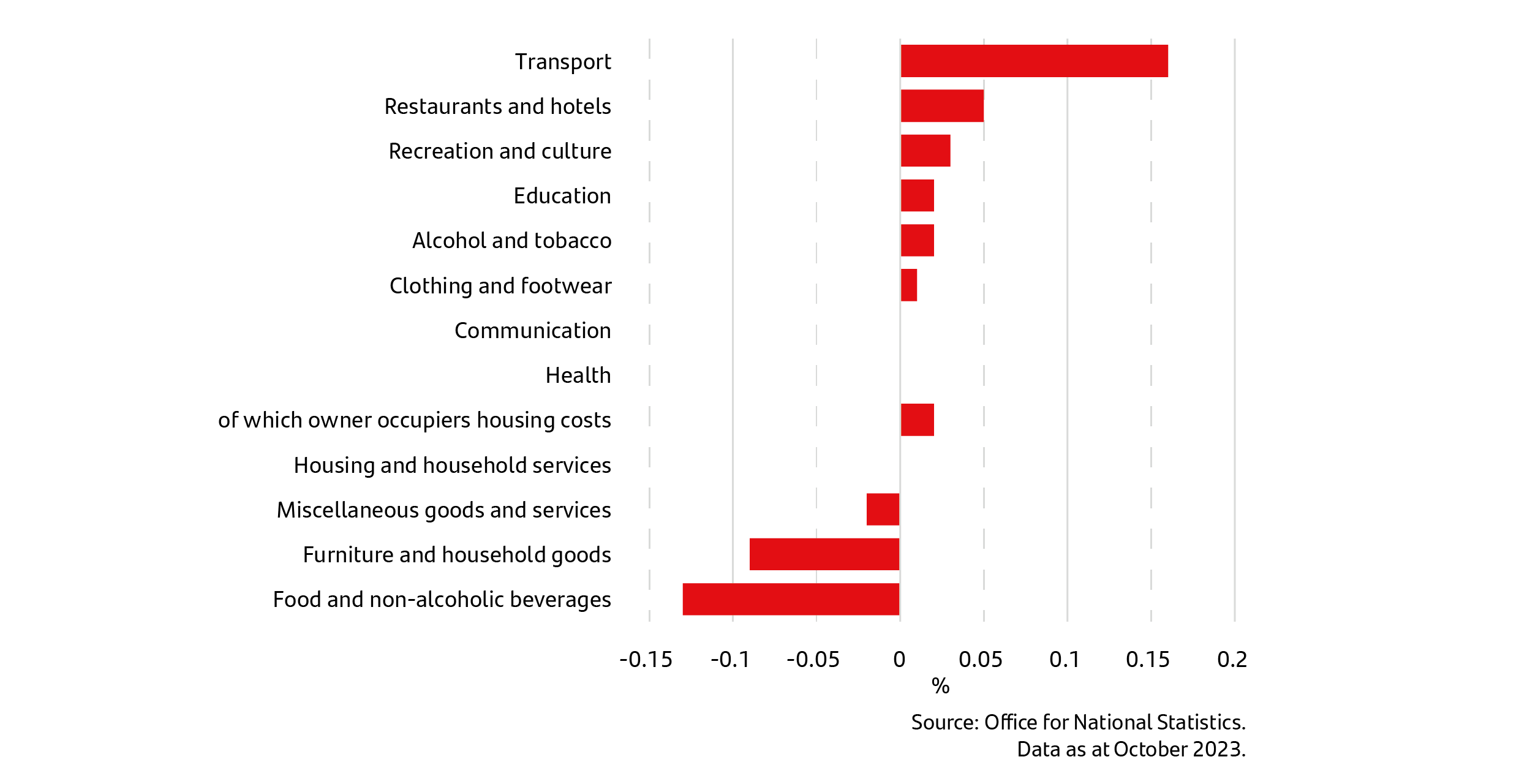
Market update
Investment markets dislike uncertainty. The expression that has been used in the past to describe stock markets is that they are a barometer, not a thermometer. In simple terms, they are guessing what the weather will be by measuring the change in air pressure. Currently, financial experts are trying to figure out the future of interest rates. Markets have priced in the central bank’s stance on interest rates as higher for longer, however, there is some debate on how long high interest rates are likely to be in place. The future path for interest rates is dominating market volatility to the extent that even when the tragic events in the Middle East unfolded over the last two weeks, while sentiment saw a small shift in the first couple of days of the conflict into safe-haven assets like bonds and gold, investors almost immediately reverted to rinse and repeat. If you look at the chart below measuring the MSCI All Companies World Stock Market Index and Bank of America’s Global Broad Bond Market Index over the last 3 months, you can see the total return for each is slightly higher (2.7% for shares and 0.75% for bonds), but the journey is best suited to a fun-fare. It serves as a reminder that investing is a long-term discipline that is maintained by keeping an eye on the final destination rather than the short-term ups and downs.
Global shares and bond market performance
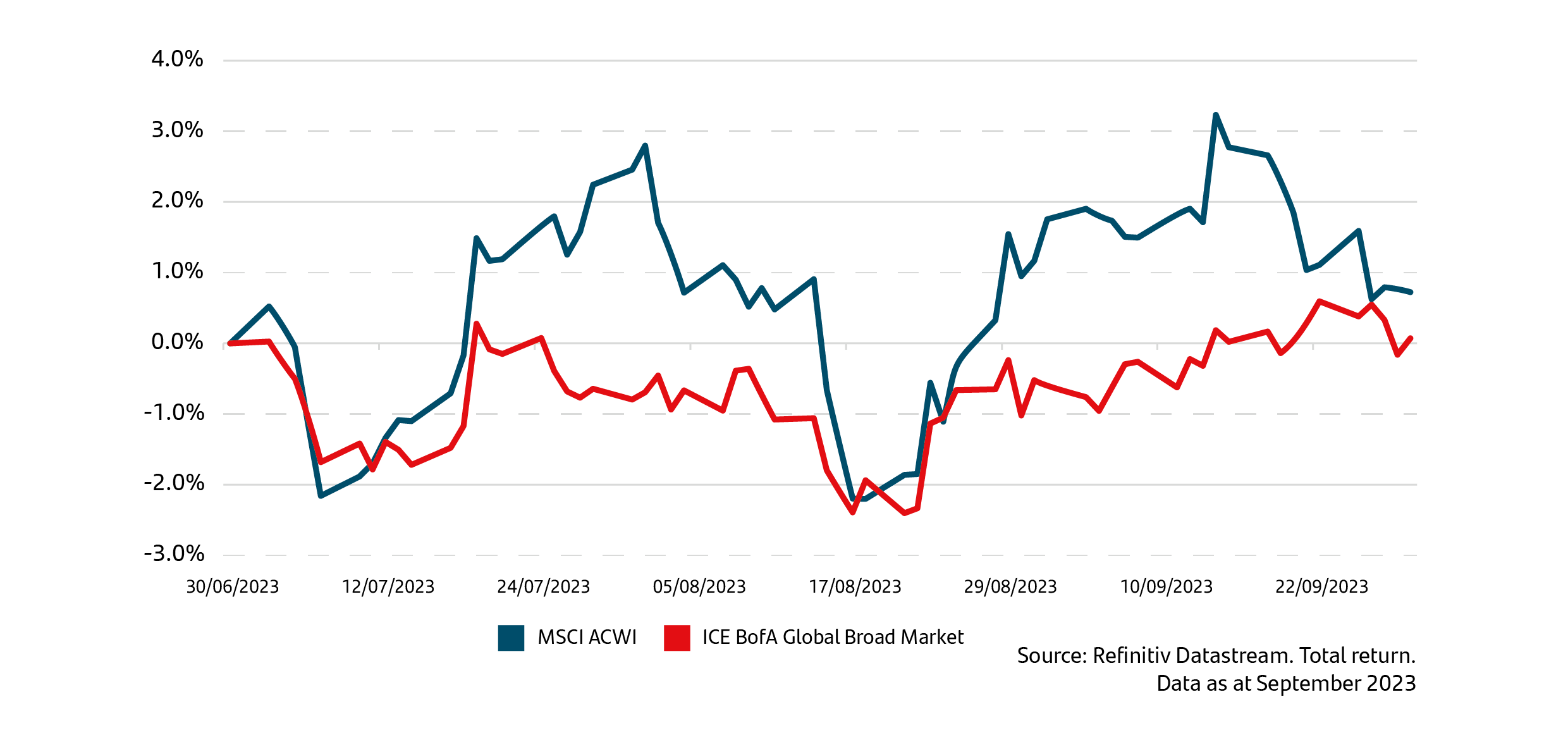
The value of seeking guidance and advice
It is important to seek advice and guidance from a professional financial adviser who can help to explain how to build an appropriate financial plan to match your time horizons, financial ambitions and risk comfort. If you already have a plan in place or have already invested, it is important to allocate time to review this to ensure this remains on track and appropriate for your needs.
Performance
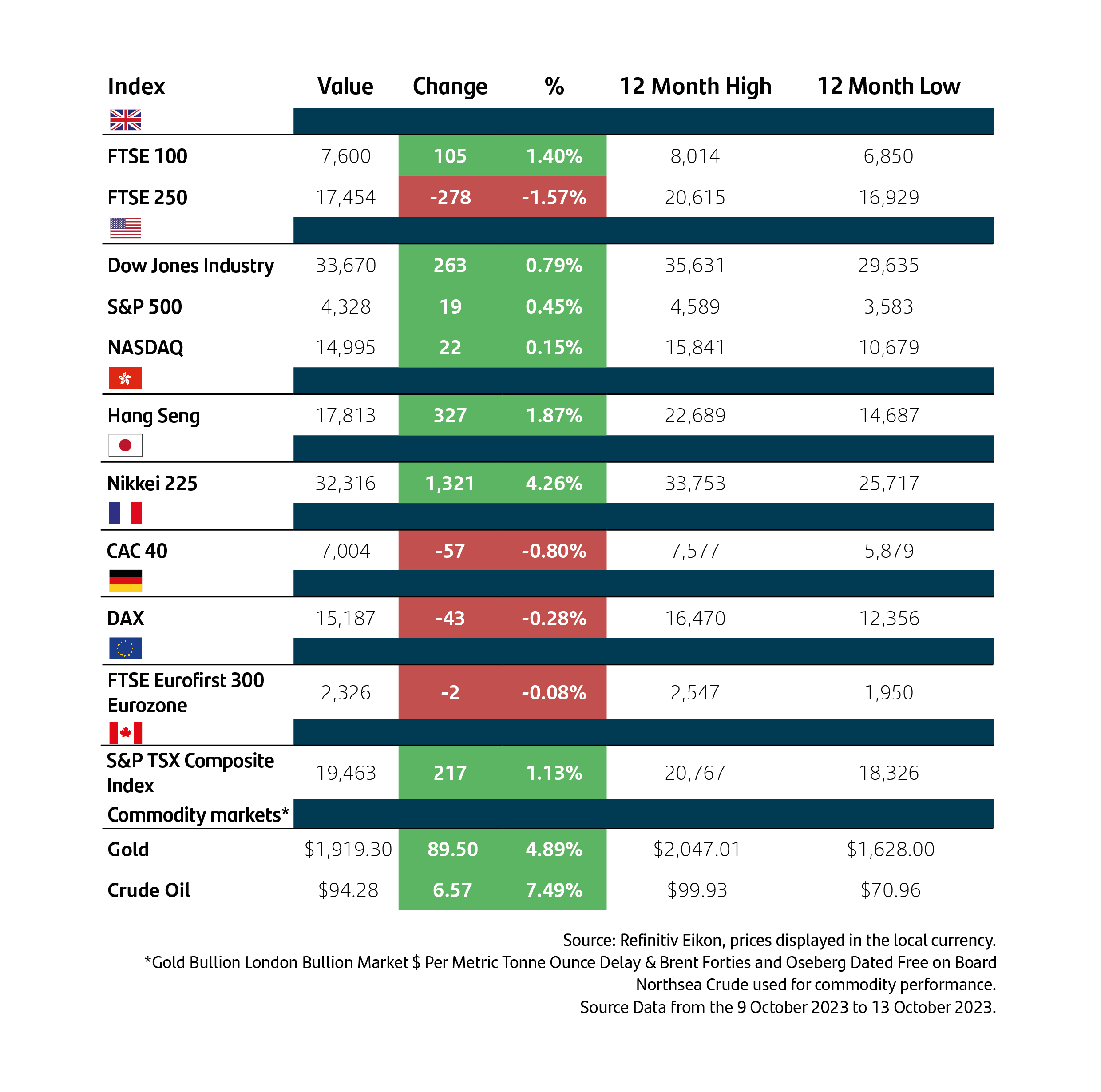
10-years bond yields
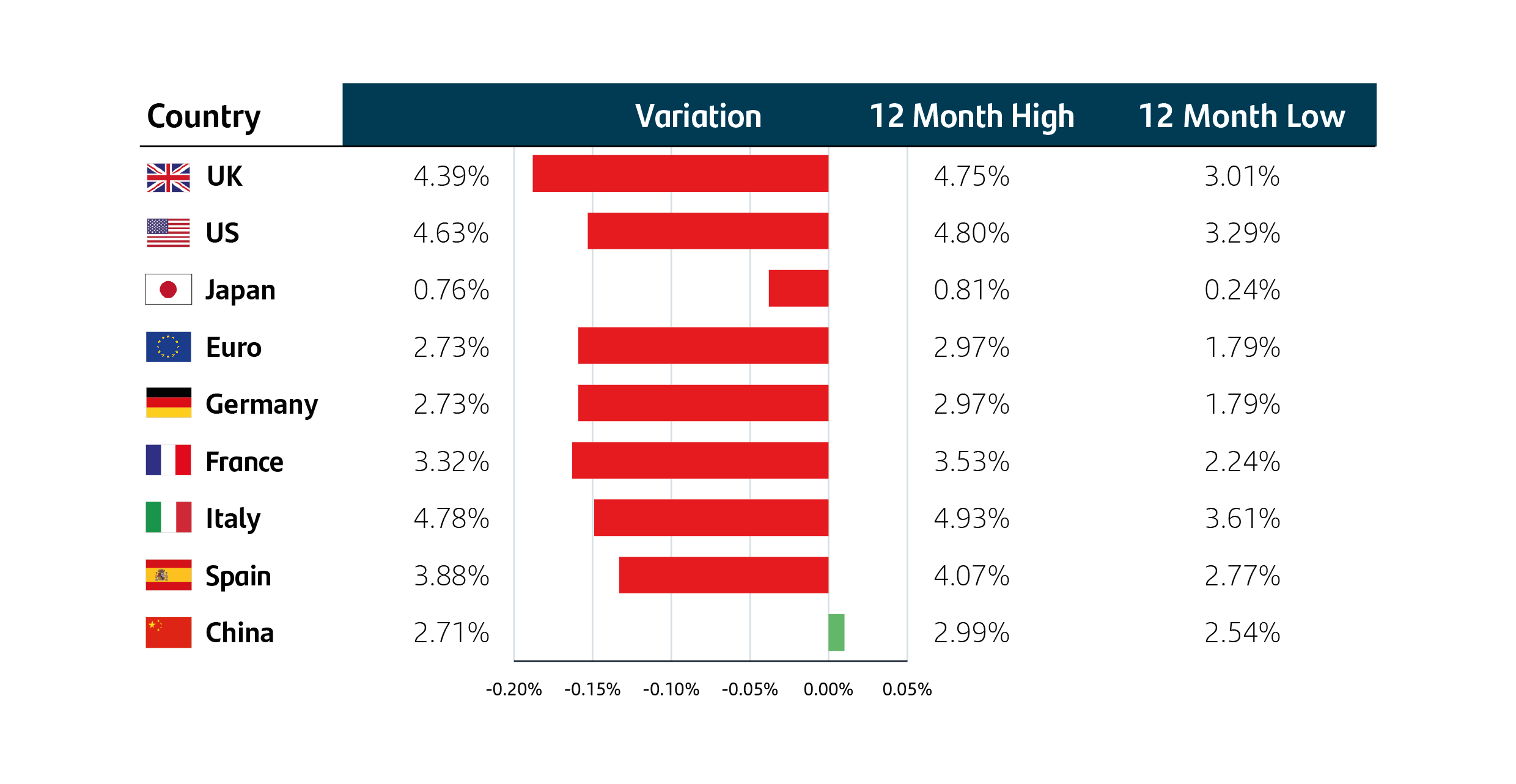
Currencies


Investing can feel complex and overwhelming, but our educational insights can help you cut through the noise. Learn more about the Principles of Investing here.
Note: Data as at 19 october 2023. 1NPR, 5 August 2022. 2Office for National Statistics, 12 October 2023. 3BBC, 10 October 2023. 4Office for National Statistics, 17 October 2023. 5Office for National Statistics, 18 October 2023. 6CNBC, 29 September 2023.
Important information
For retail distribution.
This document has been approved and issued by Santander Asset Management UK Limited (SAM UK). This document is for information purposes only and does not constitute an offer or solicitation to buy or sell any securities or other financial instruments, or to provide investment advice or services. Opinions expressed within this document, if any, are current opinions as of the date stated and do not constitute investment or any other advice; the views are subject to change and do not necessarily reflect the views of Santander Asset Management as a whole or any part thereof. While we try and take every care over the information in this document, we cannot accept any responsibility for mistakes and missing information that may be presented.
The value of investments and any income is not guaranteed and can go down as well as up and may be affected by exchange rate fluctuations. This means that an investor may not get back the amount invested. Past performance is not a guide to future performance.
All information is sourced, issued, and approved by Santander Asset Management UK Limited (Company Registration No. SC106669). Registered in Scotland at 287 St Vincent Street, Glasgow G2 5NB, United Kingdom. Authorised and regulated by the FCA. FCA registered number 122491. You can check this on the Financial Services Register by visiting the FCA’s website www.fca.org.uk/register.
Santander and the flame logo are registered trademarks.www.santanderassetmanagement.co.uk





